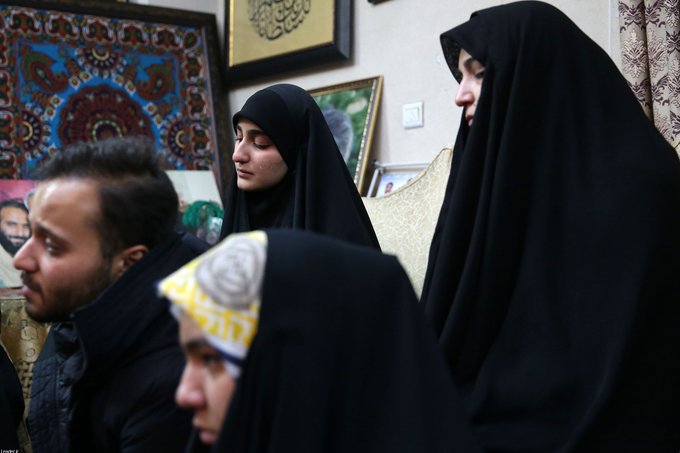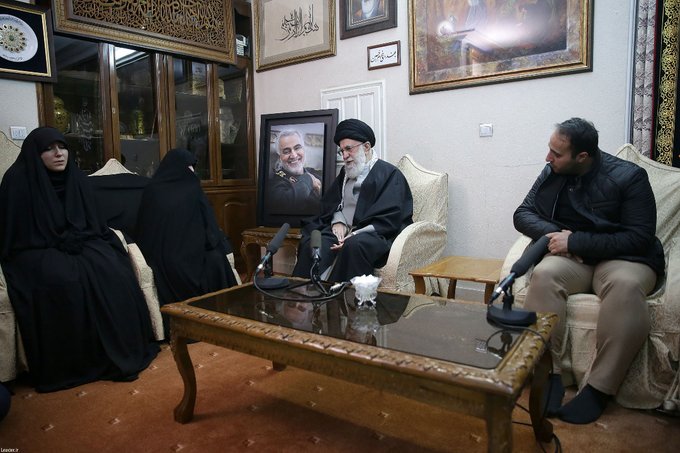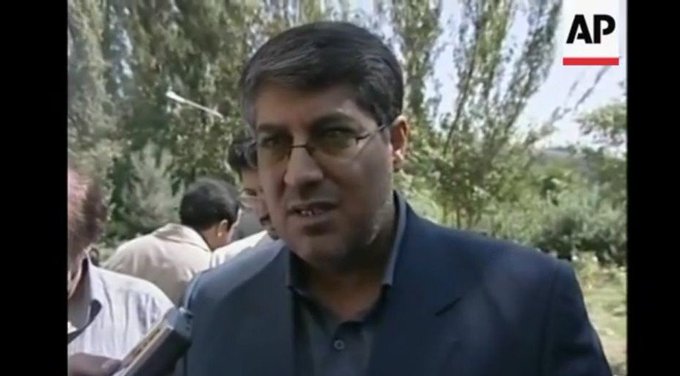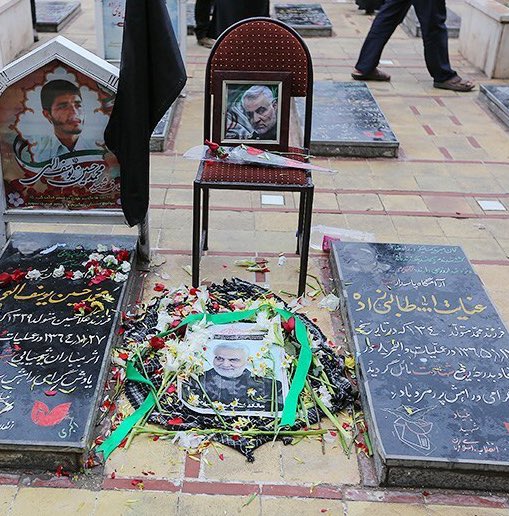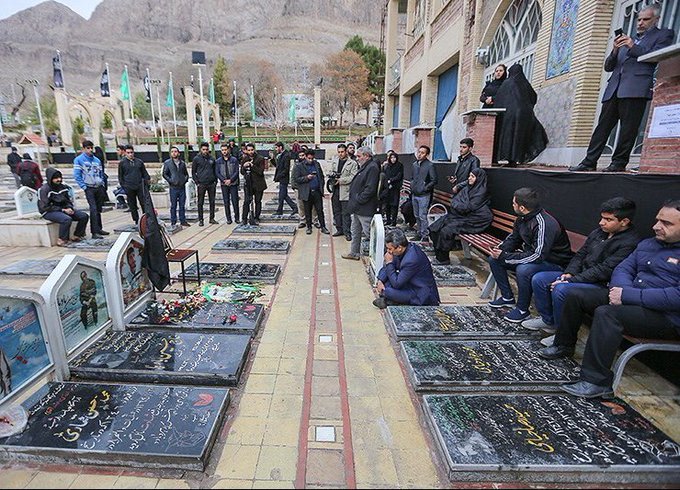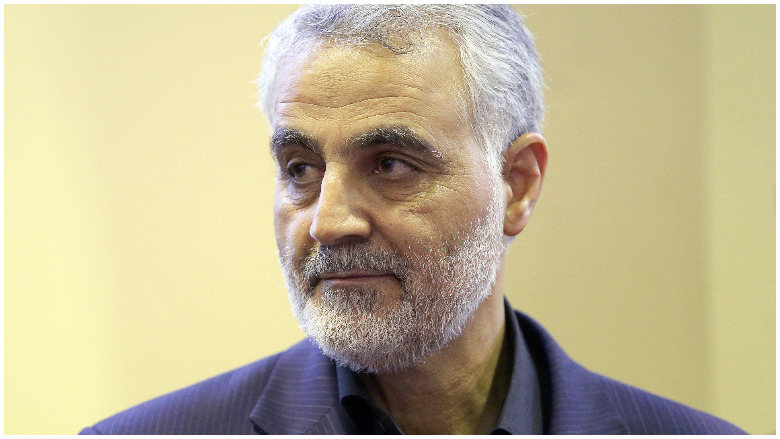
Qassem Soleimani’s wife and family, especially his daughter Zeinab, have been featured in Iranian photos and videos since Soleimani was killed by an U.S. air strike. The powerful general’s brother is a prison official who was sanctioned by the U.S. for human rights abuses. His parents came from humble means.
Soleimani rose from a financially strapped childhood to become the mastermind of Iran’s Quds Force and the country’s strategies throughout the Middle East. The United States says his plotting against U.S. assets and forces warranted President Donald Trump’s decision to take his life. The U.S. air strike struck Soleimani’s convoy near Baghdad’s airport.
Since then, there’s been a war of words between the two countries, with some of it leveled at the U.S. by Soleimani’s daughter. The streets have ballooned with mourners in multiple Iranian cities for Soleimani’s funeral procession. A stampede at a funeral procession for Soleimani in his hometown of Kerman killed 40 people.
Here’s what you need to know about Soleimani’s family:
1. Soleimani’s Daughter Zeinab Soleimani Threatened That U.S. Soldiers Will Die, Reports Say
Soleimani’s daughter has been the most publicly vocal since her father’s grisly death. Zeinab Soleimani, 28, threatened the United States on live state TV at her father’s funeral, according to NPR, which reported that she said: “The families of the American soldiers … will spend their days waiting for the death of their children.”
According to NPR, her comments were broadcast via loudspeakers to a massive crowd. According to the Sun, she made the comments before a crowd mourning the general in Tehran. She also said, according to Daily Mail: “Crazy Trump, don’t think that everything is over with my father’s martyrdom.”
Zeinab Soleimani’s comments were met with cheers from the crowd, NPR reported. It wasn’t the only incendiary remark to come out of Soleimani’s multi-city funeral procession. A eulogist in Mashhad even suggested putting an $80 million bounty on Donald Trump’s head.
Daily Beast reports that Zeinab was previously “spotted alongside Fatima Mughniyah, Emad Mughniyah’s daughter.” Mughniyah was a top Hezbollah leader.
U.S. officials say that Soleimani had the blood of American soldiers on his hands and more.
“General Qassem Soleimani has killed or badly wounded thousands of Americans over an extended period of time, and was plotting to kill many more…but got caught!” wrote President Donald Trump on Twitter. “He was directly and indirectly responsible for the death of millions of people, including the recent large number of PROTESTERS killed in Iran itself. While Iran will never be able to properly admit it, Soleimani was both hated and feared within the country. They are not nearly as saddened as the leaders will let the outside world believe. He should have been taken out many years ago!”
2. Soleimani Was the Son of a Farmer Who Once Worked for a Municipal Water Authority
Soleimani’s early biography was pretty provincial, according to an article by Ali Soufan for the Counterterrorism Center at West Point. The article says Qassem Soleimani was born in a mountain village in southeast Iran near the borders of Afghanistan and Pakistan. It’s an area dominated by tribal politicians, and his father, a farmer, once owed the government a lot of money after a “botched land reform” of the Shah.
His parents were named Hassan Soleimani and Fatemeh Soleimani. His mother is deceased.
According to Soufan, Soleimani had to work in construction and abandon school as a teenager to help his family survive as a result of the land reform issue and later became a technician with a municipal water authority. The Islamic Revolution in 1978 appears to have sparked his interest in political affairs, Soufan reported.
“He found his calling,” wrote Soufan, starting out as a recruit instructor.
Mourners gathered in front of Soleimani’s father’s house in his hometown of Kerman, according to Reuters.
3. The United States Sanctioned Soleimani’s Brother Sohrab, a Prison Official
In 2017, the United States sanctioned Soleimani’s brother, Sohrab Soleimani, as a result of his actions as an Iranian prison chief. A U.S. Treasury Department press release reported the following on Sohrab Soleimani:
In an April 2014 incident at Evin Prison, dozens of security guards and senior prison officials attacked and severely beat political prisoners being held in Ward 350. The attack lasted several hours and over 30 prisoners were wounded or injured. Some of the prisoners were placed in solitary confinement afterward and did not receive medical treatment, despite their injuries.
Sohrab Soleimani was the head of the Tehran Prisons Organization during this violent event, and is being designated for having acted for or on behalf of, directly or indirectly, Tehran Prisons Organization. After the Ward 350 prisoner attack, Soleimani denied that anything had taken place, despite the numerous well-documented accounts of the incident. Soleimani currently holds a leadership position within the State Prisons Organization, which oversees Tehran Prisons Organization. Since April 2014, attacks on prisoners and other human rights abuses at Evin Prison have continued, including the denial of access to medical care.
Treasury added, “Tehran Prisons Organization and Sohrab Soleimani are designated pursuant to Executive Order 13553, which targets serious human rights abuses by officials of, and persons acting on behalf of, the Government of Iran since the June 2009 Iranian election.”
4. Soleimani Left Instructions to His Wife About His Burial, Reports Say
Soleimani did leave behind a wife. However, Soleimani’s wife is very private and not much is known. However, he is said to have written the following in his will to his wife:
“I set my grave in the shrine of the martyrs in Kerman, Mahmoud knows where it is, make it a humble grave, like my fellow martyrs. Write on it.”
According to NBC News, President Hassan Rouhani “visited Soleimani’s house to pay respects to the late general’s family. He was seen hugging Soleimani’s son and greeting his wife.”
5. Soleimani Was Reportedly a Father of Five
According to the Sun, Soleimani is believed to have had five children – two daughters and three sons.
The Soufan article, which chronicles Soleimani’s influence in great detail, says that Iran “has projected its power across the Middle East, from Lebanon and Syria to Iraq and Yemen,” and it has used a “unique strategy of blending militant and state power, built in part on the model of Hezbollah in Lebanon” to do so.
The article says Major General Qassem Soleimani was the architect of this strategy, also calling him “the most powerful general in the Middle East today.” The article also says that Soleimani was “repeatedly touted as a possible presidential candidate.”
An Iraq official described Soleimani’s understated charisma to The New Yorker: “He is so short, but he has this presence. There will be ten people in a room, and when Suleimani walks in he doesn’t come and sit with you. He sits over there on the other side of room, by himself, in a very quiet way. Doesn’t speak, doesn’t comment, just sits and listens. And so of course everyone is thinking only about him.”
